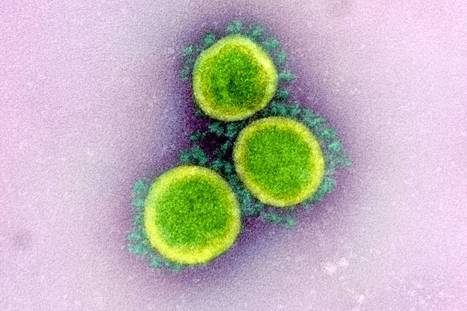
|
Scooped by Juan Lama |
The toolkit for preventing and treating patients with COVID-19 has expanded greatly since the pandemic began. Some of the most effective therapeutics for COVID-19 and, potentially, other coronavirus infections are antivirals that inhibit the SARS-CoV-2 main protease (Mpro). Mpro inhibitors include nirmatrelvir, a component of the oral treatment Paxlovid. However, second-generation drugs are needed, because there is a risk that new SARS-CoV-2 variants could become resistant to nirmatrelvir and other antivirals in clinical use. Here, Westberg et al. used the hepatitis C virus protease inhibitor boceprevir as a starting point to make such a next-generation Mpro inhibitor. Their optimized lead candidate, ML2006a4, exhibited robust antiviral activity in vitro and in mice infected with SARS-CoV-2 and could be administered orally. ML2006a4 appeared less sensitive to mutations in the SARS-CoV-2 Mpro, suggesting that the virus would be less likely to become resistant to ML2006a4 in the real world. —Courtney Malo
Inhibitors of the severe acute respiratory syndrome coronavirus 2 (SARS-CoV-2) main protease (Mpro) such as nirmatrelvir (NTV) and ensitrelvir (ETV) have proven effective in reducing the severity of COVID-19, but the presence of resistance-conferring mutations in sequenced viral genomes raises concerns about future drug resistance. Second-generation oral drugs that retain function against these mutants are thus urgently needed. We hypothesized that the covalent hepatitis C virus protease inhibitor boceprevir (BPV) could serve as the basis for orally bioavailable drugs that inhibit SARS-CoV-2 Mpro more efficiently than existing drugs.
Performing structure-guided modifications of BPV, we developed a picomolar-affinity inhibitor, ML2006a4, with antiviral activity, oral pharmacokinetics, and therapeutic efficacy similar or superior to those of NTV. A crucial feature of ML2006a4 is a derivatization of the ketoamide reactive group that improves cell permeability and oral bioavailability. Last, ML2006a4 was found to be less sensitive to several mutations that cause resistance to NTV or ETV and occur in the natural SARS-CoV-2 population. Thus, anticipatory design can preemptively address potential resistance mechanisms to expand future treatment options against coronavirus variants.
Published in Science Translational Medicine (March 13, 2024):
No comment yet.
Sign up to comment



 Your new post is loading...
Your new post is loading...








